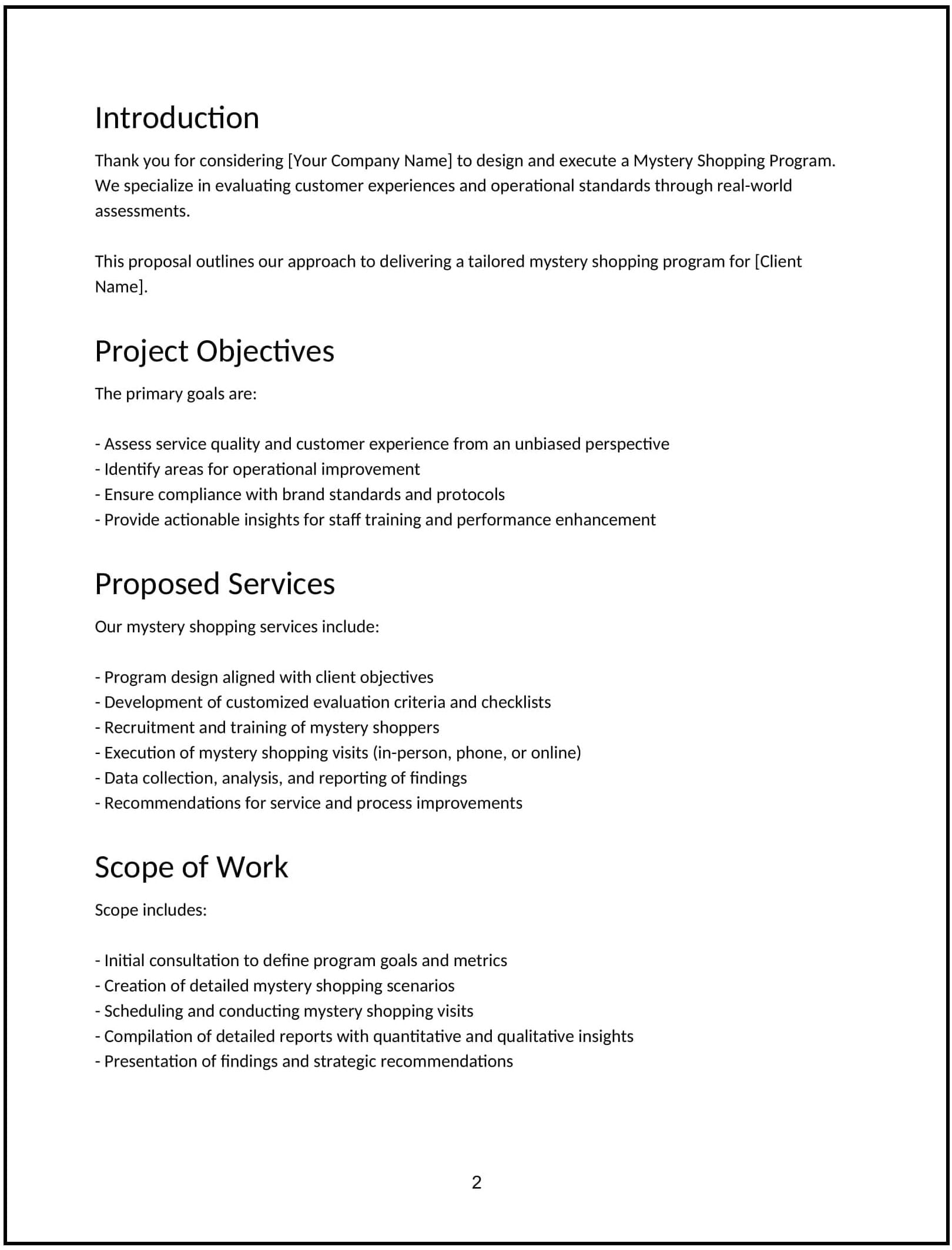Got contracts to review? While you're here for proposals, let Cobrief make contract review effortless—start your free review now.

Customize this template for free
Customize this free mystery shopping program proposal with Cobrief
Open this free mystery shopping program proposal in Cobrief and start editing it instantly using AI. You can adjust the tone, structure, and content based on your services, the client’s business goals, and the type of customer experience being evaluated. You can also use AI to review your draft — spot gaps, tighten language, and improve clarity before sending.
Once you're done, send, download, or save the proposal in one click — no formatting or setup required.
This template is fully customizable and built for real-world use — ideal for pitching experience audits, presenting ongoing customer research services, or scoping one-off mystery shopper campaigns. Whether you run these programs regularly or as a specialized service, this version gives you a structured head start and removes the guesswork.
What is a mystery shopping program proposal?
A mystery shopping program proposal outlines a plan to evaluate a client’s customer experience by sending trained shoppers to interact with their business anonymously. It helps businesses measure how real customers are treated across in-store, phone, or digital channels.
This type of proposal is typically used:
- As a first formal offer after a discovery call
- To scope a fixed-term evaluation program or an ongoing quality monitoring service
- By agencies or consultants who specialize in customer experience, retail audits, or service training
- To differentiate the service from general market research or customer surveys
It usually leads to a contract or statement of work that kicks off the actual mystery shopping engagement.
Why use Cobrief to edit your proposal
- Edit the full proposal instantly: No uploading or formatting tools needed — start working in your browser.
- Use AI to rewrite or adjust tone: Adapt section-by-section for different client profiles or industries.
- Run a full AI-powered review: Spot unclear language, missing sections, or areas for improvement.
- Apply AI suggestions in one click: Make edits manually or apply all improvements automatically.
- Save, send, or download in seconds: Keep everything in one place and export with a single click.
When to use this proposal
- When pitching a full-service mystery shopping program to a retail or hospitality brand.
- When responding to a client inquiry about measuring service quality or compliance.
- When bundling mystery shopping with training, audits, or broader CX consulting services.
- When presenting a recurring evaluation plan (e.g., monthly mystery shop visits).
- When proposing a trial run before scaling to a larger engagement.
What to include in a mystery shopping program proposal
- Introduction and context: Explain what the mystery shopping program is, and why it’s valuable for the client’s goals.
- Objectives and scope: Define what the client is trying to evaluate — e.g., service consistency, brand standards, or upselling behavior.
- Methodology and logistics: Outline how mystery shoppers will be recruited, trained, and deployed.
- Evaluation criteria: List what the shoppers will assess (e.g., greeting time, product knowledge, cleanliness).
- Reporting and insights: Explain how results will be collected, analyzed, and delivered to the client.
- Timeline and frequency: Specify how often visits will occur and how long the program will run.
- Pricing and terms: Include a clear breakdown of fees, including any setup, reporting, or per-visit charges.
- Next steps: End with a call to action — typically a meeting, signature, or kickoff date.
How to write an effective mystery shopping program proposal
- Make the client's challenges the focus: Frame your program as a solution to their customer experience or brand consistency concerns.
- Be clear about scope and limits: Avoid vague language around visit frequency, shopper profiles, or evaluation depth.
- Show how insights lead to action: Don’t just promise reports — explain how your results will improve the business.
- Use specific examples: If possible, reference past programs or outcomes to build credibility.
- Avoid generic phrases: Skip buzzwords like “comprehensive solutions” — explain what makes your approach rigorous.
- Close with a clear next step: Encourage action by ending with a confident recommendation or CTA.